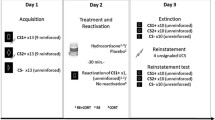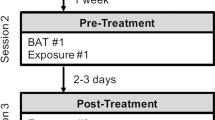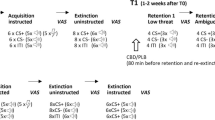Abstract
An emerging literature suggests that memory enhancement may augment the effects of learning-based treatments such as cognitive behavioral therapy. Release of stress hormones, such as cortisol, has been shown to enhance memory. In this report, we evaluated whether a cold pressor stressor (CPS), which reliably generates stress hormones, may also augment treatment for specific phobias. Spider phobics were randomly assigned to CPS or warm water bath following a standardized session of exposure therapy. Inconsistent with our hypothesis, the CPS condition showed no significant enhancement in fear reduction compared to the control condition.




Similar content being viewed by others
References
Abercrombie, H. C., Kalin, N. H., Thurow, M. E., Rosenkranz, M. A., & Davidson, R. J. (2003). Cortisol variation in humans affects memory for emotionally laden and neutral information. Behavioral Neuroscience, 117(3), 505–516.
Amaral, D. G., Price, J. L., Pitkanen, A., & Carmichael, S. T. (1992). Anatomical organization of the primate amygdaloid complex. In J. P. Aggleton (Ed.), The amygdala: Neurobiological aspects of emotion, memory, mental dysfunction (pp. 1–66). New York: Wiley-Liss.
Andreano, J. M., & Cahill, L. (2006). Glucocorticoid release and memory consolidation in men and women. Psychological Science, 17, 466–470.
Arntz, A., Lavy, E., van den Berg, G., & van Rijsoort, S. (1993). Negative beliefs of spider phobics–A psychometric evaluation of the spider phobia beliefs questionnaire. Advances in Behaviour Research and Therapy, 15, 257–277.
Bouton, M. E., Vurbic, D., & Woods, A. M. (2008). D-cycloserine facilitates context-specific fear extinction learning. Neurobiology of Learning and Memory, 90(3), 504–510. doi:10.1016/j.nlm.2008.07.003.
Buchanan, T. W., & Lovallo, W. R. (2001). Enhanced memory for emotional material following stress-level cortisol treatment in humans. Psychoneuroendocrinology, 26, 307–317.
Cahill, L., & Alkire, M. (2003). Epinephrine enhancement of human memory consolidation: Interaction with arousal at encoding. Neurobiology of Learning and Memory, 79, 194–198.
Cahill, L., Gorski, L., & Le, K. (2003). Enhanced human memory consolidation with post-learning stress: Interaction with the degree of arousal at encoding. Learning and Memory, 10, 270–274.
Cai, W. H., Blundell, J., Han, J., Greene, R. W., & Powell, C. M. (2006). Postreactivation glucocorticoids impair recall of established fear memory. Journal of Neuroscience, 26, 9560–9566.
Guastella, A. J., Dadds, M. R., Lovibond, P. F., Mitchell, P., & Richardson, R. (2007). A randomized controlled trial of the effect of D-cycloserine on exposure therapy for spider fear. Journal of Psychiatric Research, 41, 466–471.
Henry, J. D., & Crawford, J. R. (2005). The short-form version of the Depression Anxiety Stress Scales (DASS-21): Construct validity and normative data in a large non-clinical sample. British Journal of Clinical Psychology, 44, 227–239.
Het, S., Ramlow, G., & Wolf, O. T. (2005). A meta-analytic review of the effects of acute cortisol administration on human memory. Psychoneuroendocrinology, 30(8), 771–784. doi:10.1016/j.psyneuen.2005.03.005.
Kalisch, R., Holt, B., Petrovic, P., De Martino, B., Klöppel, S., Büchel, C., et al. (2009). The NMDA agonist D-cycloserine facilitates fear memory consolidation in humans. Cerebral Cortex (New York, N.Y.: 1991), 19(1), 187–196. doi:10.1093/cercor/bhn076.
Kirschbaum, C., Prussner, J. C., Stone, A. A., Federenko, I., Gaab, J., Lintz, D., et al. (1995). Persistent high cortisol responses to repeated psychological stress in a subpopulation of healthy men. Psychosomatic Medicine, 57, 468–474.
Klorman, R., Weerts, T. C., Hastings, J. E., Melamed, B. G., & Lang, P. J. (1974). Psychometric description of some specific-fear questionnaires. Behavior Therapy, 5, 401–409.
Liang, K. C., Juler, R. G., & McGaugh, J. L. (1986). Modulating effects of posttraining epinephrine on memory: Involvement of the amygdala noradrenergic system. Brain Research, 368(1), 125–133.
Lovallo, W. (1975). The cold pressor test and autonomic function: A review and integration. Psychophysiology, 12, 268–282.
Lovibond, P. F. (1998). Long-term stability of depression, anxiety, and stress syndromes. Journal of Abnormal Psychology, 107, 520–526.
Lovibond, S. H., & Lovibond, P. F. (1995). Manual for the depression anxiety stress scales. Sydney: Psychology Foundation.
McEwen, B. S. (2007). Physiology and neurobiology of stress and adaptation: Central role of the brain. Physiological Reviews, 87(3), 873–904. doi:10.1152/physrev.00041.2006.
McGaugh, J. L., Introini-Collison, I. B., & Nagahara, A. H. (1988). Memory-enhancing effects of posttraining naloxone: Involvement of beta-noradrenergic influences in the amygdaloid complex. Brain Research, 446(1), 37–49.
McRae, A. L., Saladin, M. E., Brady, K. T., Upadhyaya, H., Back, S. E., & Timmerman, M. A. (2006). Stress reactivity: Biological and subjective responses to the cold pressor and trier social stressors. Human Psychopharmacology, 21(6), 377–385. doi:10.1002/hup.778.
Muris, P., & Merckelbach, H. (1996). A comparison of two spider fear questionnaires. Journal of Behavior Therapy and Experimental Psychiatry, 27, 241–244.
Norberg, M. M., Krystal, J. H., & Tolin, D. F. (2008). A meta-analysis of D-cycloserine and the facilitation of fear extinction and exposure therapy. Biological Psychiatry, 63(12), 1118–1126. doi:10.1016/j.biopsych.2008.01.012.
Payne, J. D., Jackson, E. D., Hoscheidt, S., Ryan, L., Jacobs, W. J., & Nadel, L. (2007). Stress administered prior to encoding impairs neutral but enhances emotional long-term episodic memories. Learning and Memory, 14, 861–868.
Preuss, D., Schoofs, D., & Wolf, O. T. (2009). Association between endogenous cortisol levels and emotional memory in young women: Influence of encoding instructions. Stress, 12, 379–387.
Qin, S., Hermans, E. J., van Marle, H. J. F., Luo, J., & Fernández, G. (2009). Acute psychological stress reduces working memory-related activity in the dorsolateral prefrontal cortex. Biological Psychiatry, 66(1), 25–32. doi:10.1016/j.biopsych.2009.03.006.
Ressler, K. J., Rothbaum, B. O., Tannenbaum, L., Anderson, P., Graap, K., Zimand, E., et al. (2004). Cognitive enhancers as adjuncts to psychotherapy: Use of D-cycloserine in phobic individuals to facilitate extinction of fear. Archives of General Psychiatry, 61, 1136–1144.
Roozendaal, B. (2002). Stress and memory: Opposing effects of glucocorticoids on memory consolidation and memory retrieval. Neurobiology of Learning and Memory, 78, 578–595.
Roozendaal, B., & McGaugh, J. L. (1996). The memory-modulatory effects of glucocorticoids depend on an intact stria terminalis. Brain Research, 709(2), 243–250.
Schoofs, D., Wolf, O. T., & Smeets, T. (2009). Cold pressor stress impairs performance on working memory tasks requiring executive functions in healthy young men. Behavioral Neuroscience, 123(5), 1066–1075. doi:10.1037/a0016980.
Schwabe, L., Bohringer, A., Chatterjee, M., & Schachinger, H. (2008). Effects of pre-learning stress on memory for neutral, positive and negative words: Different roles of cortisol and autonomic arousal. Neurobiology of Learning and Memory, 90(1), 44–53. doi:10.1016/j.nlm.2008.02.002.
Sharpley, C., Kauter, K., & McFarlane, J. (2008). An initial exploration of in vivo hair cortisol responses to a brief pain stressor: Latency, localisation and independence effects. Physiological Research/Academia Scientiarum Bohemoslovaca. Retrieved July 13, 2009, from http://www.ncbi.nlm.nih.gov/pubmed/19093721.
Smeets, T., Otgaar, H., Candel, I., & Wolf, O. T. (2008). True or false? Memory is differentially affected by stress-induced cortisol elevations and sympathetic activity at consolidation and retrieval. Psychoneuroendocrinology, 33, 1378–1386.
Smits, J. A. J., Telch, M., & Randall, P. K. (2002). An examination of the decline in fear and disgust during exposure-based treatment. Behaviour Research and Therapy, 11, 1243–1253.
Stark, R., Wolf, O. T., Tabbert, K., Kagerer, S., Zimmermann, M., Kirsch, P., et al. (2006). Influence of the stress hormone cortisol on fear conditioning in humans: Evidence for sex differences in the response of the prefrontal cortex. NeuroImage, 32(3), 1290–1298. doi:10.1016/j.neuroimage.2006.05.046.
Szymanski, J., & O’Donohue, W. (1995). Fear of spiders questionnaire. Journal of Behavior Therapy and Experimental Psychiatry, 26, 31–34.
Tomaz, C., Dickinson-Anson, H., & McGaugh, J. L. (1992). Basolateral amygdala lesions block diazepam-induced anterograde amnesia in an inhibitory avoidance task. Proceedings of the National Academy of Sciences of the United States of America, 89(8), 3615–3619.
van Stegeren, A. H., Wolf, O. T., & Kindt, M. (2008). Salivary alpha amylase and cortisol responses to different stress tasks: Impact of sex. International Journal of Psychophysiology: Official Journal of the International Organization of Psychophysiology, 69(1), 33–40. doi:10.1016/j.ijpsycho.2008.02.008.
Walker, D. L., Ressler, K. J., Lu, K. T., & Davis, M. (2002). Facilitation of conditioned fear extinction by systemic administration or intra-amygdala infusions of D-cycloserine as assessed with fear-potentiated startle in rats. Journal of Neuroscience, 22, 2343–2351.
Wolf, O. T. (2008). The influence of stress hormones on emotional memory: Relevance for psychopathology. Acta Psychologica, 127, 513–531.
Yuen, E. Y., Liu, W., Karatsoreos, I. N., Feng, J., McEwen, B. S., & Yan, Z. (2009). Acute stress enhances glutamatergic transmission in prefrontal cortex and facilitates working memory. Proceedings of the National Academy of Sciences of the United States of America, 106(33), 14075–14079. doi:10.1073/pnas.0906791106.
Acknowledgments
There was no extramural funding for this project.
Author information
Authors and Affiliations
Corresponding author
Rights and permissions
About this article
Cite this article
Schmidt, N.B., Anthony Richey, J., Funk, A.P. et al. Cold Pressor “Augmentation” Does Not Differentially Improve Treatment Response for Spider Phobia. Cogn Ther Res 34, 413–420 (2010). https://doi.org/10.1007/s10608-010-9310-6
Published:
Issue Date:
DOI: https://doi.org/10.1007/s10608-010-9310-6




